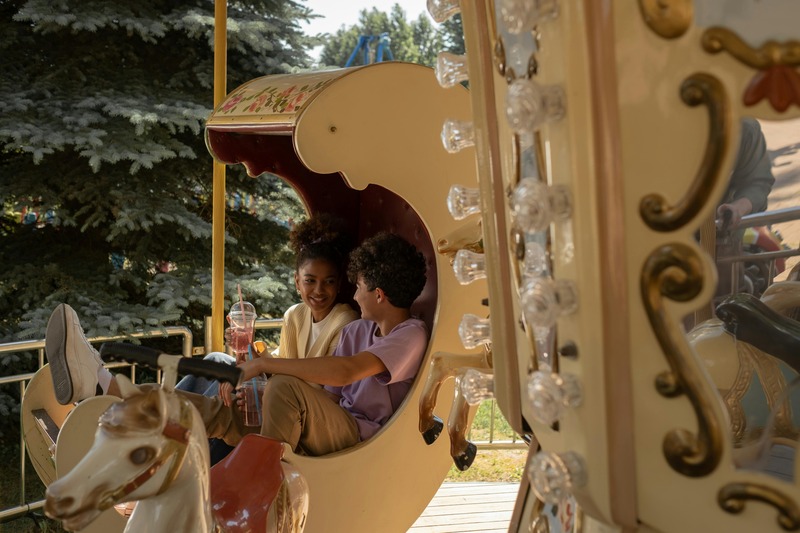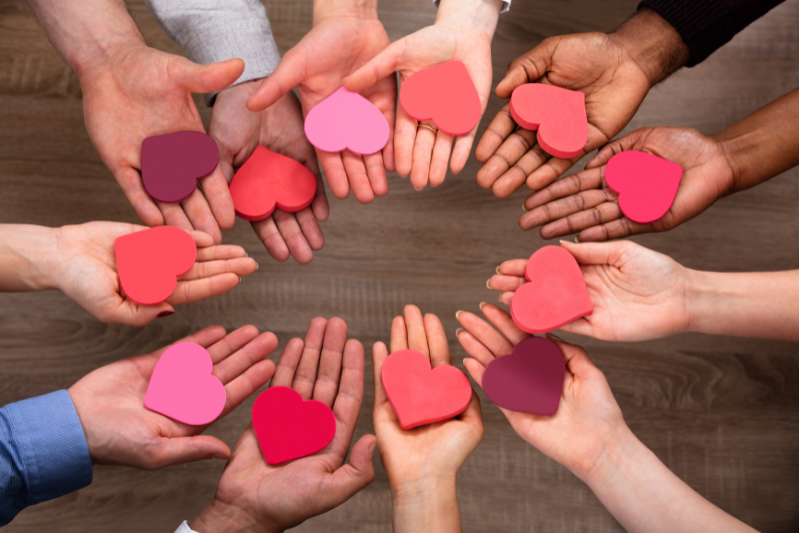Gratitude Day invites us to pause and focus on appreciation, not only for what we have but also for ourselves, our partners, and our bodies. This holiday season, rooted in thankfulness, traces back to indigenous traditions that honor gratitude as a fundamental part of life, showing respect for the earth, community, and interconnectedness. For many indigenous cultures, giving thanks is not limited to a single day but is woven into daily practices that acknowledge nature’s abundance and shared relationships. Embracing this deeper, holistic approach can enhance our own self-reflection, fostering stronger relationships, improved mental well-being, and a more fulfilling sexual life.
The Power of Gratitude on Mental and Physical Well-Being
Gratitude isn’t just a positive sentiment; it has tangible effects on our mental health. Studies show that regularly practicing gratitude can reduce stress, elevate mood, and improve sleep patterns. When we feel grateful, our brains release “feel-good” hormones like dopamine and serotonin. These neurotransmitters enhance our mood, ease anxiety, and can even help with symptoms of depression. The hormone oxytocin, known as the “love hormone,” is also boosted by gratitude and plays a vital role in our feelings of connection and attachment. This biological response strengthens our ability to connect, feel pleasure, and embrace intimacy.
The connection between the mind and body, especially in sexual experiences, becomes even more powerful with gratitude.The brain is after all, our largest sex organ. When we’re mentally present, calm, and receptive to pleasure, our ability to connect with ourselves and others improves significantly.

Your Brain: The Ultimate Gratitude Processor
Gratitude Day invites us to reflect on how our brains, our powerful control centers, shape our sexual experiences and relationships. When it comes to the brain during sex, there isn’t a single “sexual center” in the brain. Instead, we use multiple regions for memory, problem-solving, and pleasure processing, which work together to create rich, multi-dimensional experiences. Engaging in a practice like gratitude only amplifies this experience.
Research shows that gratitude practices activate regions of the brain associated with emotional regulation and pleasure, similar to the effects of engaging in enjoyable activities. By focusing on gratitude, we prime our minds to notice positive aspects of our relationships, whether that means savoring small gestures from a partner or appreciating personal growth and self-discovery.
Gratitude in Relationships: The Foundation of Lasting Intimacy
Gratitude isn’t just a personal exercise; it’s also a powerful practice in relationships. Expressing appreciation regularly can strengthen emotional bonds and foster greater intimacy. Gratitude, in many ways, is an acknowledgment of our partner’s presence, love, and contributions. It’s a way of saying, “I see you, and I value who you are in my life.”
Partners who practice gratitude together are more likely to report higher satisfaction levels in their relationship. I encourage couples to use this time of year to reflect on the qualities they appreciate in each other and the moments they’ve shared. Whether it’s small acts of kindness, shared laughter, or mutual support, reflecting on these positive elements helps to build a solid foundation of trust and love. In turn, these positive emotions can lead to more satisfying and connected sexual experiences.

Using Gratitude to Address Intimacy Challenges
Intimacy and sexual experiences don’t always come without challenges. In times of difficulty—be it from life changes, stress, or health issues—focusing on gratitude can create a new perspective. If faced with a physical or emotional barrier, expressing gratitude can help soften our approach toward ourselves and our partners. This mindset shift helps us accept challenges as part of our journey rather than obstacles to be overcome.
I highly recommend a gratitude-based communication exercise for couples going through a difficult phase. Take turns with your partner to express three things you appreciate about each other. It might sound simple, but this exchange can deepen your connection by reminding both partners of the unique qualities they bring to the relationship. Practicing this on Gratitude Day can open doors to more open, empathetic communication, which, in turn, can bring renewed excitement and passion.
Bringing Gratitude into Physical Touch and Intimacy
Touch, one of our most basic forms of communication, can be a powerful avenue to express gratitude. Physical touch—whether a warm hug, a hand squeeze, or an intimate embrace—releases oxytocin, strengthening our emotional connection. When touch is coupled with genuine gratitude, it becomes even more meaningful. It shifts the experience from routine affection to intentional appreciation, deepening the emotional connection.
I encourage couples to incorporate gratitude into their physical intimacy by being mindful of their touches and gestures. Instead of simply going through the motions, take a moment to appreciate your partner’s presence and willingness to share this intimate space with you. Whether it’s a gentle massage, a loving cuddle, or a romantic evening, practicing mindful gratitude in these moments can create a safe, affirming, and joyous experience that brings both partners closer.

Incorporating Gratitude into Communication
Communication is the bedrock of any relationship, and gratitude can transform how we connect and share with our partners. By incorporating words of gratitude into our conversations, we can cultivate a more compassionate and positive dialogue. Simple acknowledgments like “Thank you for listening to me” or “I appreciate your patience” can make a significant difference in creating an open, supportive environment.
Strive for intentional, heartfelt communication where each partner feels valued and understood. When we speak with gratitude, we express our appreciation and model how we wish to be treated. This creates a ripple effect, encouraging our partners to reciprocate with kindness and appreciation, reinforcing a positive communication cycle.
Self-Gratitude and Self-Love
Gratitude Day isn’t just about appreciating others; it’s also about appreciating yourself. Self-love is a foundational element of sexual health and confidence. When we practice self-gratitude, we see our unique worth, celebrate our bodies, and acknowledge our needs. This self-appreciation creates a mental state where we feel deserving of pleasure, love, and joy.
Taking the time to be grateful for ourselves can boost self-confidence in intimate settings. By recognizing our strengths and accepting our bodies, we enter relationships with greater self-assuredness. We’re less reliant on external validation and more inclined to experience authentic, self-driven pleasure.

Practicing Self-Gratitude in the Mirror
Self-gratitude is an important part of self-love and confidence, and it can be as simple as looking in the mirror. Taking a moment each day to look at yourself and express appreciation for who you are, both physically and emotionally, can be an incredibly affirming practice. This exercise may initially feel uncomfortable, but it encourages you to embrace your body, mind, and unique qualities without judgment.
Start with small affirmations, such as “I’m grateful for my smile” or “I appreciate the strength my body gives me.” Over time, this practice can lead to greater self-acceptance and confidence both inside and outside the bedroom. Self-gratitude encourages us to celebrate our individuality and reinforces that we are worthy of love, pleasure, and happiness.
Practicing Gratitude in Everyday Life: Building Your Personal Routine
The benefits of Gratitude Day don’t have to be limited to a single day. Making gratitude a regular part of your daily life can lead to a more fulfilling life, intimate relationships, and a more grounded, more resilient mind.
Here are some ways to bring gratitude into your everyday routine:
- Start a Gratitude Journal – Each day, write down three things you’re grateful for. Over time, you’ll build a log of positive reflections that can be uplifting in challenging times.
- Mindful Moments – Take a few minutes each day to mindfully reflect on moments that brought you joy, peace, or fulfillment. These don’t have to be grand moments—sometimes, a warm cup of tea, a kind word, or a beautiful sunset can be enough.
- Self-Compassion – Practicing self-gratitude goes beyond acknowledging accomplishments. Embrace your humanness and imperfections, honor your body’s journey, and celebrate the small steps toward self-discovery and growth.
- Gratitude Letters – Writing a letter of gratitude to yourself, a friend, or a partner can be a powerful experience. If you have someone special in your life, expressing your appreciation for their presence and the joy they bring into your life can deepen your bond.
- End-of-Day Reflection – Before going to bed, think of one thing that made you smile, feel comforted, or proud during the day. This affirming reflection can help you end the day on a life affirming positive note and allow your sleep to be more restful and restorative.

Making Gratitude a Lifelong Practice
Celebrating Gratitude Day is a beautiful start, and, the journey of gratitude has no end. The more we integrate gratitude into our daily lives, the more we stand to benefit in terms of mental health, relationship satisfaction, and self-love. Gratitude isn’t a one-time act but an ongoing commitment to self-compassion, connection, and growth. As we continue to practice gratitude—whether through mindful reflection, self-love, or appreciation for our partners—we create a foundation that supports a fulfilling, connected, and joyful life.
By embracing gratitude daily, we lay the groundwork for healthier relationships, mental well-being, and a deeper understanding of our unique journeys. On this Gratitude Day, may we all take a moment to honor ourselves, celebrate our relationships, and look forward to a lifetime of shared love and connection. Thank you for joining in this celebration and for embracing the beautiful practice of gratitude in all its forms! If you’re looking for guidance or support on your relationship journey, I’m here for you—don’t hesitate to get in touch!

